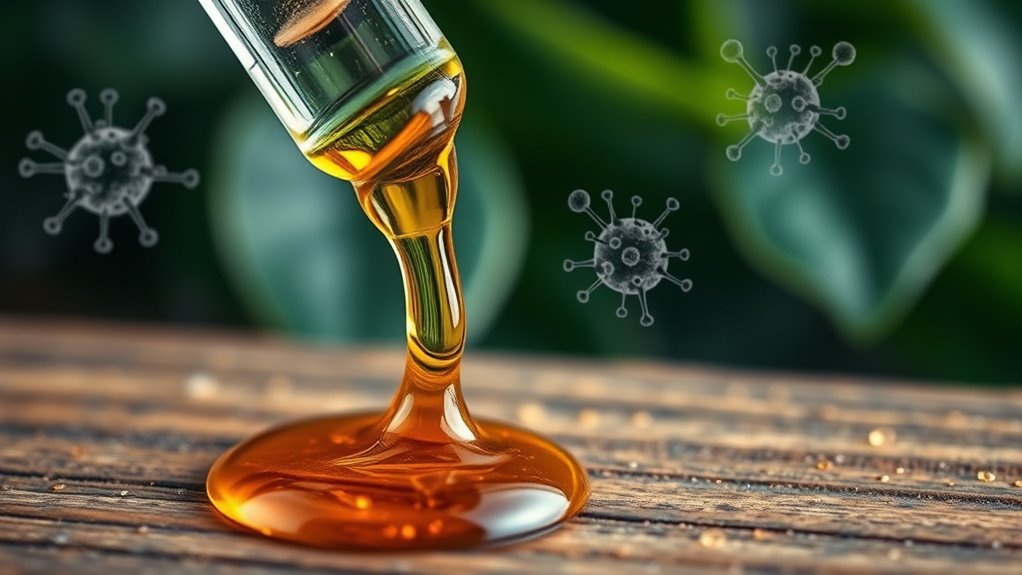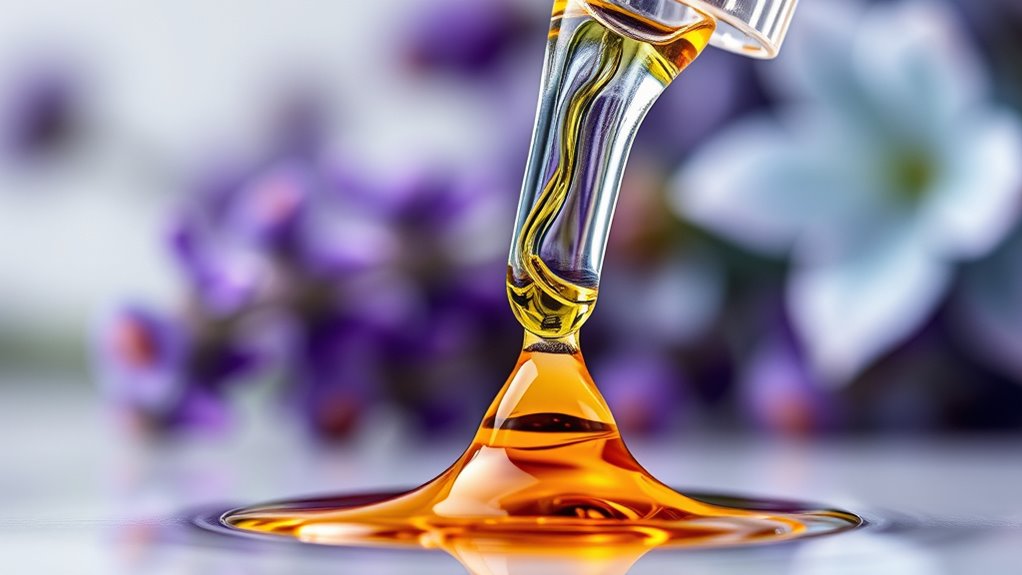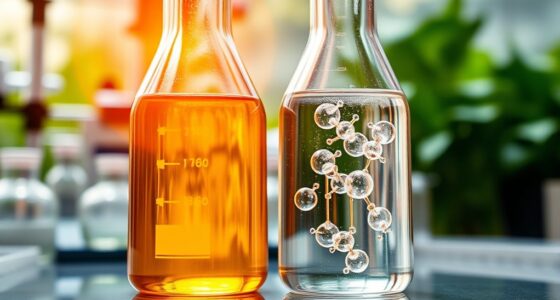Essential oils are often marketed as natural germ killers, but their actual effectiveness depends on their chemical makeup, which varies greatly. Compounds like phenols can have strong antimicrobial properties, but not all oils contain enough of these for cleaning purposes. Factors like extraction methods and environmental conditions alter their power. While they may inhibit some microbes in lab tests, they won’t reliably disinfect surfaces in practical use. Keep exploring to understand the science behind these claims.
Key Takeaways
- Essential oils contain compounds like phenols that can inhibit or kill certain microbes, but efficacy varies greatly.
- Laboratory studies show antimicrobial activity, yet real-world effectiveness depends on concentration, contact time, and surface.
- Variability in chemical composition due to extraction methods and environmental factors limits consistency and reliability.
- Essential oils are not proven to fully sterilize surfaces and should not replace conventional disinfectants.
- Marketing claims often exaggerate germ-killing abilities; scientific evidence indicates limited, variable antimicrobial effects.

Have you ever wondered if essential oils can really fight germs? It’s a common question, especially with all the marketing claims promising natural disinfectants. To understand whether essential oils truly have antimicrobial properties, it helps to look at their antimicrobial efficacy and chemical composition. These two factors reveal a lot about what essential oils can and can’t do when it comes to germs.
The antimicrobial efficacy of essential oils varies widely depending on their chemical makeup. Some oils, like tea tree, eucalyptus, and oregano, are often touted for their ability to inhibit bacteria and fungi. Scientific studies show that these oils contain compounds that can disrupt microbial cell structures or interfere with their metabolic processes.
Essential oils’ antimicrobial effects depend on their unique chemical compositions.
For example, tea tree oil contains terpinen-4-ol, which has demonstrated antimicrobial activity in laboratory settings. However, the efficacy often depends on the concentration used and the specific strains of germs in question. While lab results can be promising, they don’t always translate directly to practical, everyday use.
The chemical composition of essential oils is complex. They’re made up of dozens of different compounds, including terpenes, alcohols, esters, and phenols. These compounds are responsible for both the scent and the antimicrobial activity.
For instance, phenols like thymol and carvacrol are known for their strong antimicrobial effects. But it’s important to recognize that not all compounds in an oil contribute equally to germ-killing properties. Some may be mildly antimicrobial, while others have little to no effect.
Additionally, the composition can vary based on how the oil is extracted, the plant’s growing conditions, and even the time of harvest. This variability can make it challenging to predict the precise antimicrobial efficacy of a given essential oil.
It’s tempting to believe that essential oils can replace conventional disinfectants, but the reality is more nuanced. While some oils do exhibit antimicrobial activity in controlled studies, their effectiveness in real-world situations is often limited by factors such as dilution, contact time, and surface compatibility.
Furthermore, the chemical variability in essential oils means that their antimicrobial properties can differ significantly from batch to batch, impacting their reliability as disinfectants. This inconsistency underscores the importance of understanding the chemical composition and the limitations of relying solely on essential oils for sterilization purposes.
The marketing hype sometimes exaggerates these properties, leading consumers to think that a few drops of oil can sterilize surfaces or wipe out all germs. In truth, essential oils can be part of a cleaning routine, but they shouldn’t be relied upon as the sole method of disinfection.
Frequently Asked Questions
Can Essential Oils Replace Traditional Disinfectants Safely?
You might wonder if essential oils can replace traditional disinfectants safely. While they offer a natural alternative to synthetic disinfectants, they aren’t proven to be as effective for all germs.
Relying solely on essential oils may leave you unprotected, especially against serious pathogens. It’s best to use them as complementary, not replacements, and follow proper cleaning protocols for safety.
Always consult health guidelines before substituting essential oils for conventional disinfectants.
Are There Specific Essential Oils Proven to Eliminate Certain Germs?
You wonder if specific essential oils can eliminate germs. While some oils, like tea tree and eucalyptus, show antimicrobial properties, their effectiveness varies due to natural synergy and chemical variability.
You should know that scientific proof isn’t conclusive, and results differ based on factors like concentration and application.
Relying solely on essential oils for germ elimination isn’t advised; they may complement but not replace traditional disinfectants.
How Long Do Essential Oils’ Antimicrobial Effects Last?
The duration effectiveness of essential oils’ antimicrobial properties varies depending on factors like concentration and environment.
Generally, their antimicrobial effects last from a few minutes to several hours, but they don’t provide long-lasting protection.
You should understand the longevity of antimicrobial properties is limited, so relying solely on essential oils isn’t enough for ongoing germ control.
Use them as a supplementary measure along with proper hygiene for better results.
Do Essential Oils Work Better Against Bacteria or Viruses?
You ask if essential oils work better against bacteria or viruses. In aromatherapy, oils like tea tree and eucalyptus are known for their antibacterial properties, but their effectiveness against viruses is less clear.
When absorbed through the skin, some oils may provide antimicrobial benefits, but they’re not a substitute for proper hygiene or medical treatment. Overall, they may help support your immune system but aren’t guaranteed to kill all germs.
Are There Risks in Using Essential Oils as Germ Killers?
Think of essential oils as double-edged swords—you might be tempted to use them as germ killers, but risks exist. You could trigger essential oil allergies or cause skin sensitivity, turning your healthy intentions into harm.
Always dilute properly and test patches first. Ignoring these precautions risks irritation or allergic reactions, reminding you that natural doesn’t always mean safe.
Use them wisely, respecting their power and potential dangers.
Conclusion
So, next time you spritz your diffuser with that fancy essential oil blend, remember—those vibrant scents might not be the germ-killers they’re marketed as. While they create a pleasant aroma, don’t rely on them to wipe out bacteria or viruses. Ironically, the very marketing that promises “germ-killing power” often overlooks chemistry’s subtle truths. In the end, scent alone isn’t a substitute for good hygiene—so enjoy your oils, but don’t forget the basics.









